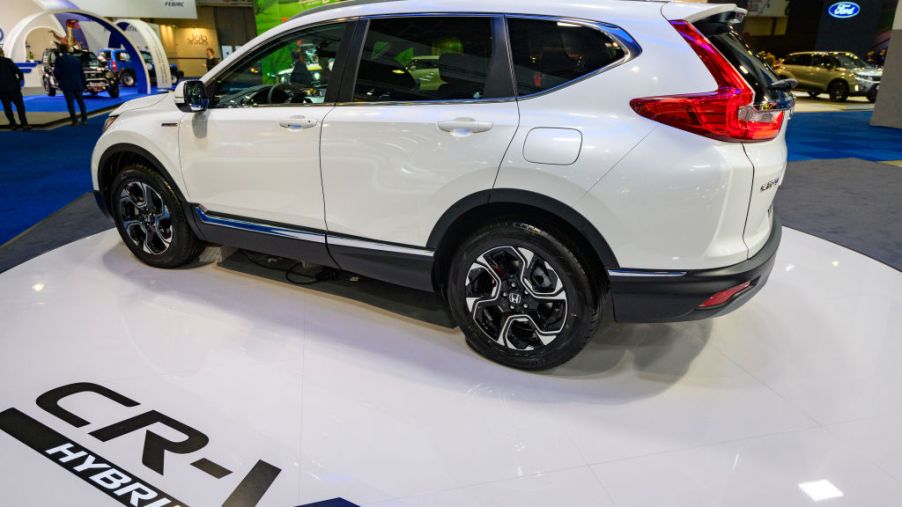
The 2020 Honda CR-V Hybrid’s Real-World Fuel Economy Disappoints
When the EPA evaluates new model vehicles for fuel efficiency, consumers are used to seeing, and relying on, a range of estimates and ratings. Typically, you’ll find a city driving estimate, a highway driving estimate, and a combined average overall. Knowing how much you can expect to shell out in terms of trips to the gas station, can help you calculate a cost of ownership. So, these data points are critical.
When you consider a hybrid variation, you might assume, too, that fuel economy is ranked better. For the 2020 Honda CR-V Hybrid, this is certainly the case. But according to Car and Driver, the estimates don’t quite square up with real-world driving fuel efficiency. And the results may actually fall considerably short of the EPA suggested ratings.
The official fuel efficiency ratings for the 2020 Honda CR-V Hybrid
The popular hybrid crossover officially rates with a 38-mpg combined average. Highway driving means enjoying a 35-mpg rating, while city driving boasts 40 mpg. The powertrain setup is similar to that of the Honda Accord Hybrid variety.
Honda knows a thing or two about developing strong hybrid contenders, considering the automaker has been selling its sedan and hatchbacks here in the states for a while now, and the CR-V Hybrid in Europe for more than a year. Even the gas-powered Honda CR-V offers healthy fuel efficiencies with combined averages between 29 and 38 mpg, depending on the engine configuration.
Why Car and Driver is disappointed with the new Honda CR-V Hybrid
When Car and Driver sat down behind the wheel for its review of the 2020 Honda CR-V this year, the experts looked to see how the EPA ratings squared up with real-world driving.
When put to the test, the CR-V proved to be disappointing when it only averaged 33 mpg in mixed driving conditions. Even at highways speeds of 75 miles per hour, the CR-V Hybrid only managed to squeeze four mpg better than the gas-powered CR-V, and still three mpg shy of the EPA official rating for the hybrid version.
The 2020 Toyota RAV4 Hybrid is more impressive
In addition to falling short in real-world fuel economy outputs, and based on the EPA ratings, the Honda CR-V Hybrid isn’t too incredibly competitive. In fact, the Toyota RAV4 Hybrid offers 41 mpg in the city and 38 mpg on the highway. The Ford Escape Hybrid crossover returns 43 mpg in the city and 37 mpg on the highway.
According to the fuel ratings achieved by the Car and Driver experts, the 2020 Honda CR-V Hybrid matches the older, 2019 Toyota RAV4 ratings. Of course, the CR-V Hybrid is the first all-wheel-drive hybrid of its kind. Toyota uses a rear-end mounted electric motor system, while Honda’s version mirrors its non-hybrid platform. This translates to a slightly harder acceleration, based on a rear axle clutch engaging.
Why fuel economy matters when considering a hybrid
Depending on the variation you buy, the 2020 Honda CR-V Hybrid can cost anywhere from $27,000 to $36,000. The non-hybrid version has an MSRP range of $25,000 to $31,500. So if you plan to spend the extra on hybrid technology, you should expect considerable savings in fuel economy.
Unfortunately, the CR-V Hybrid seems to be marginal in its class based on EPA ratings and falls short in the real-world driving tests performed by the Car and Driver reviewers. In the end, you may be not only paying more up-front but also paying more with more frequent visits to the gas pump.
Ultimately, there’s nothing wrong with the 2020 Honda CR-V Hybrid. In fact, it’s a top contender in a variety of other areas, including safety and amenities. However, if buying a hybrid for you means expecting top-notch fuel efficiencies, there are certainly other crossover models with better results.


